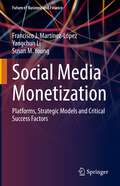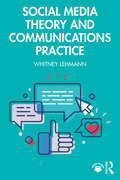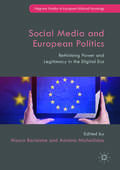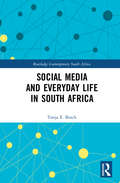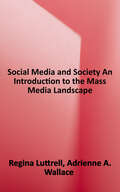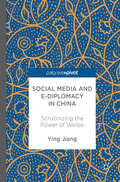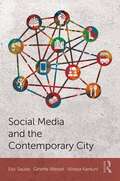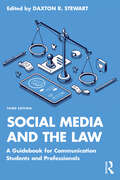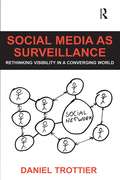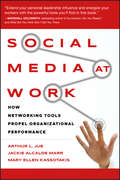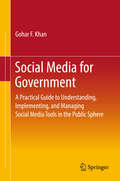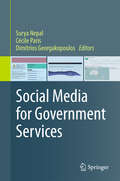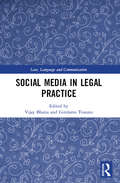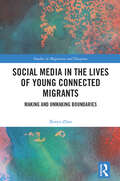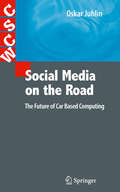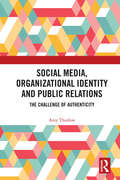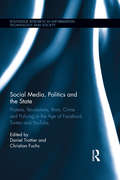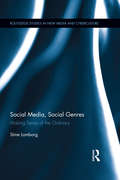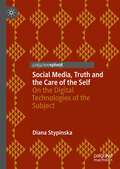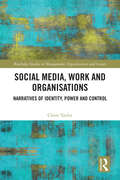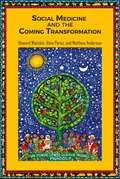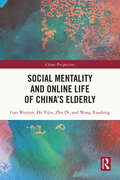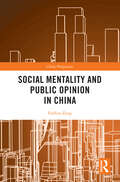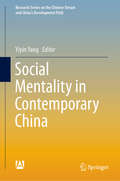- Table View
- List View
Social Media Monetization: Platforms, Strategic Models and Critical Success Factors (Future of Business and Finance)
by Francisco J. Martínez-López Yangchun Li Susan M. YoungSocial media initiatives, when effectively used and correctly monetized, can engage customers better and provide higher ROI rates than traditional marketing and sales initiatives. This book presents a selection of monetization strategies that can help companies benefit from social media initiatives and overcome the current challenges in connection with generating and growing revenues. Using cases and examples covering several social media platforms, the authors describe a variety of strategies and holistic solutions for companies. In addition, the book highlights the latest social media innovations, best business practices, successful monetization cases, and strategic trends in future social media monetization.Top executives need to read this book to have a big picture of corporate-wide “social strategy,” form a “social mindset,” and infuse a “social gene” into their company’s culture, strategy, and business processes. Armed with these social elements, companies can gain confidence, effectively introduce social media tools, and invest in major social media initiatives. Due to changing consumer behavior, social media is also ideal for building and sustaining quality relationships with customers – which is why it is becoming an indispensable element in today’s business.
Social Media Theory and Communications Practice
by Whitney LehmannFusing the academic with the applied, this book provides a comprehensive introduction to social media for future communications professionals. While most social media texts approach the subject through either a theoretical, scholarly lens or a professional, practical lens, this text offers a much-needed linkage of theory to the practical tactics employed by social media communicators. Concise and conversational chapters break down the basics of both social media theory and practice and are complemented by sidebars written by scholars and industry professionals, chapter summaries and end-of-chapter exercises. This book is ideal for introductory social media courses in communication, public relations and mass communication departments, as well as courses in digital media and public relations. Online resources include social media writing templates, sample posts and content calendar templates. Please visit www.routledge.com/9781032185873.
Social Media Theory and Communications Practice
by Whitney LehmannFusing the academic with the applied, this book provides a comprehensive introduction to social media for future communications professionals.While most social media texts approach the subject through either a theoretical, scholarly lens or a professional, practical lens, this text offers a much-needed linkage of theory to the practical tactics employed by social media communicators. Concise and conversational chapters break down the basics of both social media theory and practice and are complemented by sidebars written by scholars and industry professionals, chapter summaries and end-of-chapter exercises.This book is ideal for introductory social media courses in communication, public relations and mass communication departments, as well as courses in digital media and public relations.Online resources include social media writing templates, sample posts and content calendar templates. Please visit www.routledge.com/9781032185873.
Social Media and European Politics
by Mauro Barisione Asimina MichailidouThis volume investigates the role of social media in European politics in changing the focus, frames and actors of public discourse around the EU decision-making process. Throughout the collection, the contributors test the hypothesis that the internet and social media are promoting a structural transformation of European public spheres which goes well beyond previously known processes of mediatisation of EU politics. This transformation addresses more fundamental challenges in terms of changing power relations, through processes of active citizen empowerment and exertion of digitally networked counter-power by civil society, news media, and political actors, as well as rising contestation of representative legitimacy of the EU institutions. Social Media and European Politics offers a comprehensive approach to the analysis of political agency and social media in European Union politics, by bringing together scholarly works from the fields of public sphere theory, digital media, political networks, journalism studies, euroscepticism, political activism and social movements, political parties and election campaigning, public opinion and audience studies.
Social Media and Everyday Life in South Africa (Routledge Contemporary South Africa)
by Tanja E BoschThis book explores how social media is used in South Africa, through a range of case studies exploring various social networking sites and applications. This volume explores how, over the past decade, social media platforms have deeply penetrated the fabric of everyday life. The author considers South Africans’ use of wearable tech and use of online health and sports tracking systems via mobile phones within the broader context of the digital data economy. The author also focuses on the dating app Tinder, to show how people negotiate and redefine intimacy through the practice of online dating via strategic performances in pursuit of love, sex and intimacy. The book concludes with the use of Facebook and Twitter for social activism (e.g. Fees Must Fall), as well as networked community building as in the case of the #ImStaying movement. This book will be of interest to social media academics and students, as well as anyone interested in social media, politics and cultural life in South Africa.
Social Media and Society: An Introduction to the Mass Media Landscape
by Regina Luttrell Adrienne A. WallaceRegina Luttrell and Adrienne A. Wallace present an engaging introduction to social media's integration with modern society. Recognizing categories of relational, societal, and self while analyzing the social media environment, this introductory mass communications textbook establishes a framework for understanding how technology, culture, democracy, economy, and audience fragmentation interact with each media industry differently and relate to media literacy. Armed with this knowledge, future professional communicators gain a better understanding of their audience and the level to which their strategies influence the public. The text empowers students as consumers and creators of social media and illustrates that, while the tools of communication have changed, the goals of social connection and influence have not. Features of this unique text include the following: - Relational/Societal/Self boxes provide a framework for analysis of media and society - In Theory boxes attaching theory to practice - Learning tools and enhanced pedagogy, such as Learning Objectives, Chapter Wrap-Up; Critical Thinking Questions, Media Sources, and End of Chapter Activities - Comprehensive Glossary of key terms - Full-color visuals capturing key trends and up-to-date data
Social Media and e-Diplomacy in China
by Ying JiangAs with many spheres of public life, public diplomatic communication is being transformed by the boom of social media. More than 165 foreign governmental organisations in China have embarked on the use of Weibo (a hybrid of Facebook and Twitter in China) to engage with Chinese citizens and reach out to youth populations, one of the major goals of current public diplomacy efforts. This exciting new pivot, based on systemic research of Weibo usage by embassies in China, explores the challenges and the limits that the use of Chinese Weibo (and Chinese social media in general) poses for foreign embassies, and considers ways to use these or other tools. It offers a systematic study of the effectiveness and challenges of using Weibo for public diplomatic communication in and with China. Addressing the challenges of e-diplomacy, it considers notably the occurrence of cyber-nationalism on Weibo and encourages a critical look at its practice, arguing how it can contribute to the goals of public diplomacy.
Social Media and the Contemporary City
by Eric Sauda Ginette Wessel Alireza KarduniThe widespread adoption of smartphones has led to an explosion of mobile social media data, more than a billion messages per day that continuously track location, content, and time. Social Media in the Contemporary City focuses on the effects of social media on local communities and urban space in a variety of political and economic settings related to social activism, informal economic activity, public art, and global extremism. The book covers events ranging from Banksy art installations, mobile food trucks, and underground restaurants, to a Black Lives Matter protest, the Christchurch mosque shootings, and the Pulse nightclub shooting. The interplay between urban space, local community, and social media in each case study requires diverse methodologies that are both computational (i.e. machine learning, social network analysis, and natural language processing) and ethnographic (i.e. semi-structured interviews, thematic analysis, and site analysis). The book views social media not as a replacement for the local community or urban space but rather as a translation of the uses and meanings of all three realms. The book will be of interest to students, researchers, and instructors in a number of disciplines including urban design/planning, media studies, geography, and communications.
Social Media and the Law: A Guidebook for Communication Students and Professionals
by Daxton R. StewartThis fully updated third edition of Social Media and the Law offers an essential guide to navigating the complex legal terrain of social media. Social media platforms like Facebook, Twitter, Instagram, YouTube, and TikTok have become vital tools for professionals in the news and strategic communication fields. As these services have rapidly grown in popularity, their legal ramifications have continued to develop, resulting in students and professional communicators needing to be aware of laws relating to defamation, privacy, intellectual property, and government regulation. Editor Daxton Stewart brings together eleven media law scholars to address key questions, such as the following: To what extent do communicators put themselves at risk for lawsuits when they use these tools? What rights do communicators have when other users talk about them on social networks? How can people and companies manage intellectual property issues consistent with the developing law in this area? This book is essential for students of media, mass communication, strategic communication, journalism, advertising, and public relations, as well as professional communicators that use social media in their role.
Social Media as Surveillance: Rethinking Visibility in a Converging World
by Daniel TrottierWhile there is a lot of popular and academic interest in social media, this is the first academic work which addresses its growing presence in the surveillance of everyday life. Some scholars have considered its impact on privacy, but these efforts overlook the broader risks for users. Commonsense recommendations of care and vigilance are not enough, as attempts to manage an individual presence are complicated by the features which make social media 'social'. Facebook friends routinely expose each other, and this information leaks from one context to another. This book develops a surveillance studies approach to social media by presenting first hand ethnographic research with a variety of personal and professional social media users. Using Facebook as a case-study, it describes growing monitoring practices that involve social media. What makes this study unique is that it not only considers social media surveillance as multi-purpose, but also shows how these different purposes augment one another, leading to a rapid spread of surveillance and visibility. Individual, institutional, market-based, security and intelligence forms of surveillance therefore co-exist with each other on the same site. Not only are they drawing from the same interface and information, but these practices also augment each other. This groundbreaking research considers the rapid growth and volatility of social media technology by treating these aspects as central to social media surveillance.
Social Media at Work
by Arthur L. Jue Mary Ellen Kassotakis Jackie Alcalde MarrThe definitive guide for using social media to build more effective organizationsToday's networking technologies-wikis, blogs, and social networking sites-are changing how we build professional relationships and work collaboratively. In this insightful book, three organizational development experts from Oracle Corporation offer executives down-to-earth strategies for leveraging the power of social media to build more effective and agile organizations, engage employees, and sustain competitiveness.Offers practical advice for using social media (wikis, blogs, and social networking sites) to increase organizational effectivenessPresents proven recommendations for building teams, accelerating learning, and fostering innovation by adopting social networking toolsShows how to tap into the power of social networks to improve organizational performanceDemonstrates how social media will help organizations thrive for years to come by drawing on case studies from companies like Intel, Cisco, Nokia, and others
Social Media for Government
by Gohar F. KhanThis book provides practical know-how on understanding, implementing, and managing main stream social media tools (e. g. , blogs and micro-blogs, social network sites, and content communities) from a public sector perspective. Through social media, government organizations can inform citizens, promote their services, seek public views and feedback, and monitor satisfaction with the services they offer so as to improve their quality. Given the exponential growth of social media in contemporary society, it has become an essential tool for communication, content sharing, and collaboration. This growth and these tools also present an unparalleled opportunity to implement a transparent, open, and collaborative government. However, many government organization, particularly those in the developing world, are still somewhat reluctant to leverage social media, as it requires significant policy and governance changes, as well as specific know-how, skills and resources to plan, implement and manage social media tools. As a result, governments around the world ignore or mishandle the opportunities and threats presented by social media. To help policy makers and governments implement a social media driven government, this book provides guidance in developing an effective social media policy and strategy. It also addresses issues such as those related to security and privacy.
Social Media for Government Services
by Surya Nepal Cécile Paris Dimitrios GeorgakopoulosThis book highlightsstate-of-the-art research, development and implementation efforts concerningsocial media in government services, bringing together researchers andpractitioners in a number of case studies. It elucidates a number ofsignificant challenges associated with social media specific to governmentservices, such as: benefits and methods of assessing; usability andsuitability of tools, technologies and platforms; governance policies andframeworks; opportunities for new services; integrating social media with organisationalbusiness processes; and specific case studies. The book also highlights therange of uses and applications of social media in the government domain, atboth local and federal levels. As such, it offers a valuable resource for abroad readership including academic researchers,practitioners in the IT industry, developers, and government policy- anddecision-makers.
Social Media in Legal Practice (Law, Language and Communication)
by Vijay K. BhatiaThere are multiple aspects of electronically-mediated communication that influence and have strong implications for legal practice. This volume focuses on three major aspects of mediated communication through social media. Part I examines social media and the legal community. It explores how this has influenced professional legal discourse and practice, contributing to the popularity of internet-based legal research, counselling and assistance through online services offering explanations of law, preparing documents, providing evidence, and even encouraging electronically mediated alternative dispute resolution. Part II looks at the use of social media for client empowerment. It examines how it has taken legal practice from a formal and distinct business to one that is publicly informative and accessible. Part III discusses the way forward, exploring the opportunities and challenges. Based on cases from legal practice in diverse jurisdictions, the book highlights key issues as well as implications for legal practitioners on the one hand, and clients on the other. The book will be a valuable reference for international scholars in law and other socio-legal studies, discourse analysis, and practitioners in legal and alternative dispute resolution contexts.
Social Media in the Lives of Young Connected Migrants: Making and Unmaking Boundaries (ISSN)
by Xinyu ZhaoDigital media are a key part of everyday social life for international migrants. However, we don’t know enough about how these migrants critically understand and cope with the cultures and infrastructures of ubiquitous connectivity while on the move. Social Media in the Lives of Young Connected Migrants explores and theorises what it means for young migrants to live in a digital age. Presenting a richly detailed analysis of Chinese international students’ everyday social media practices, the book unravels the meanings of digital connectivity in general and how contemporary mobile young generations respond to such changes. Drawing on ethnographic and interview data, this book highlights the enabling aspects of connective media in migration journeys and shows how and why young Chinese migrants manage or even resist being connected. With close attention to diasporic, intercultural, family, and professional migrant identities and relationships, the author provides a nuanced account of living with digital media in everyday settings. Focusing on the boundary practices associated with social media, the book offers a unique analytical framework through which to capture the complex intersections of digital communication technologies and migrant social life. This volume will appeal to students and scholars interested in researching Chinese diasporas, digital migration, and youth cultures.
Social Media on the Road
by Oskar JuhlinIn the future, everyday life in traffic will be intricately meshed with city life. Today motorways, cities and streets are places where we spend a considerable amount of time, and where a large number of everyday encounters between people occur. Any road user's journey coincides with hundreds or even thousands of others. This book unpacks the details of the practical achievements involved in socially engaging with people at high speed. Although, generally speaking, these encounters are brief and interaction is slight, the recent emergence of mobile technologies offers opportunities to support drivers and passengers beyond just helping them to reach their destination. New social media could enhance interaction in traffic making life on the road more interesting and meaningful. Such innovative applications could include car stereos that share music amongst drivers; digital games that interact with the landscape passing outside the car windows, or with passengers in surrounding cars; message systems that allow drivers to help each other; and web applications that allow motorcyclists to socialize on the road. Social Media on the Road - The Future of Car Based Computing provides a bridge between research in transport planning and traffic technology, and new media areas such as Computer Human Interaction and Computer Supported Cooperative Work. Those studying and researching in the areas of human computer interaction in mobile use contexts, and those interested in developing new forms of mobile applications and services will find this book an excellent resource. Oskar Juhlin is Associate Professor and Director of the Mobile Life VinnExcellence Centre at Stockholm University and Interactive Institute. 'This book represents a pioneering and key research work that examines the future of transportation being merged with communication and interactive media. It also provides a glimpse of the future potential of mixed reality entertainment for children and family on the move. It is essential for scientists, designers, and engineers working on mobile social media, as well as for business people looking for new potential urban transport media services.' Professor Adrian D. Cheok, Graduate School of Media Design, Keio University.
Social Media, Organizational Identity and Public Relations: The Challenge of Authenticity (Routledge New Directions in PR & Communication Research)
by Amy ThurlowPublic relations has been swift to grasp social media, yet its impact on public relations practice remains relatively unexplored. This book focusses on a way of understanding organizational identity construction in a virtual context, developing scholarship on the importance of a virtual presence in PR management, and further, to make sense of these identities as authentic, legitimate or plausible. Through a diverse group of empirical case studies, this book explores the global perspective on organizational identities which transcend global boundaries via the internet including Volkswagen’s emissions scandal and Monsanto and organized social media protests. It also explores crowdfunding – an emerging form of capitalist development constructed through sensemaking in social media. By looking at the emergence of organization in today’s social media environment, it identifies how the interactive is created on a digitally mediated platform, sharing knowledge and engaging individuals in organizational identity construction. Viewing the social construction of organizational identities through this lens, this innovative book locates how identities are plausible, authentic and legitimate - or not – through their ongoing communication via social media. It will be of great interest to academics teaching and researching in public relations, organisational communication and social media.
Social Media, Politics and the State: Protests, Revolutions, Riots, Crime and Policing in the Age of Facebook, Twitter and YouTube (Routledge Research in Information Technology and Society #16)
by Christian Fuchs Daniel TrottierThis book is the essential guide for understanding how state power and politics are contested and exercised on social media. It brings together contributions by social media scholars who explore the connection of social media with revolutions, uprising, protests, power and counter-power, hacktivism, the state, policing and surveillance. It shows how collective action and state power are related and conflict as two dialectical sides of social media power, and how power and counter-power are distributed in this dialectic. Theoretically focused and empirically rigorous research considers the two-sided contradictory nature of power in relation to social media and politics. Chapters cover social media in the context of phenomena such as contemporary revolutions in Egypt and other countries, populism 2.0, anti-austerity protests, the fascist movement in Greece's crisis, Anonymous and police surveillance.
Social Media, Social Genres: Making Sense of the Ordinary (Routledge Studies in New Media and Cyberculture)
by Stine LomborgInternet-based applications such as blogs, social network sites, online chat forums, text messages, microblogs, and location-based communication services used from computers and smart phones represent central resources for organizing daily life and making sense of ourselves and the social worlds we inhabit. This interdisciplinary book explores the meanings of social media as a communicative condition for users in their daily lives; first, through a theoretical framework approaching social media as communicative genres and second, through empirical case studies of personal blogs, Twitter, and Facebook as key instances of the category of "social media," which is still taking shape. Lomborg combines micro-analyses of the communicative functionalities of social media and their place in ordinary people’s wider patterns of media usage and everyday practices.
Social Media, Truth and the Care of the Self: On the Digital Technologies of the Subject
by Diana StypinskaThis book explores the relationship between (post)truth and subjectivity by focusing on social media as a site of digital subjectification. These days, truth is cheap. Anyone can claim it. Indeed, most do – impudently and without any recourse to facts or objective reality. Truth-claims today are nothing but power grabs, employed in the permanent popularity contest that our culture and politics have become. Correspondingly, our very sense of reality is perpetually uprooted. Post-truth sets us adrift. Navigating by smartphones, we pursue endless mirages, coming to wonder whether the shoreline itself is a myth. The book examines the ways in which different digital practices – such as influencing, trolling and digital activism – operate as technologies of the subject, shaping how we relate to ourselves, others and the world. It argues that social media facilitates the progressive eclipsing of our subjective (dis)positions by the economic imperative. Positioning post-truth as the outcome of unbridled economicization, it exposes the true costs of its supremacy. The critical reflections on the relationship between digital subjectification and the social offered by this book will be of relevance to academics and students working in the fields of sociology, media and cultural studies, politics, and philosophy.
Social Media, Work and Organisations: Narratives of Identity, Power and Control (Routledge Studies in Management, Organizations and Society)
by Claire TaylorSocial media use is a confounding aspect of organisations, aiding interconnection, communication, and productivity. Its use has undoubtedly impacted on human resource management and the establishment of harmonious contemporary employment relationships. Its use challenges the traditional boundaries which existed between work and privacy and, in doing so, seemingly increases organisational power and management control. This book discusses the impact social media has on work; how it is used to stage the organisation, self-identity, power, and control using four conceptual themes: adoption, shaping, and staging of social media in organisations; digitised regimes of power, control, and surveillance; evolving identity, employee voice, and dramaturgical performance online; and employee forms of resistance, sousveillance, and social media misbehaviours. These themes are brought to life through the lived experiences and narratives of workers who hold roles in human resources, management, and frontline operations. This approach highlights a unique multi-perspective on social media use by giving voice to these workers. The book uses these individual narratives to reposition the ways employees utilise social media for sousveillance, dissent, and resistance purposes. In doing so, the book encourages wider debate, critical reflection, and self-reflexivity on rarely discussed management approaches or (mis)behaviours associated with social media use and their profound implications for power dynamics in organisations.
Social Medicine and the Coming Transformation
by Howard Waitzkin Alina Pérez Matt AndersonSocial medicine, starting two centuries ago, has shown that social conditions affect health and illness more than biology does, and social change affects the outcomes of health and illness more than health services do. Understanding and exposing sickness-generating structures in society helps us change them. This first introductory textbook in social medicine provides a critical introduction to this increasingly important field. The authors draw on examples worldwide to show how principles based on solidarity and mutual aid have enabled people to participate collaboratively to construct health-promoting social conditions. The book offers vital information and analysis to enhance our understanding regarding the promotion of health through social and individual means; the micro-politics of medical encounters; the social determination of illness; the influences of racism, class, gender, and ethnicity on health; health and empire; and health praxis, reform, and sociomedical activism. The book offers compelling ways to understand and to change the social dimensions of health and health care. Students, teachers, practitioners, activists, policy makers, and people concerned about health and health care will value this book, which goes beyond the usual approaches of texts in public health, medical sociology, health economics, and health policy.
Social Mentality and Online Life of China's Elderly (ISSN)
by Gao Wenjun He Yijin Zhu Di Wang XiaobingThis book investigates the Internet use and online engagement of China's elderly population, especially in relation to the formation of their social mentality and vision.The online life of the elderly is a complex issue that is important for both economic development and social progress. In a country with a rapidly aging population like China, overlooking the online needs of the elderly and the extent to which they are met can have serious consequences for society as a whole. This book examines the impact of the Internet on the lives and social mindset of this population, specifically by analyzing their vision, i.e., their perception and concept of the world, of which the Internet is an integral part. It aims to better understand how the elderly use and adapt to the Internet, the challenges they face, and how their online experience shapes their social attitudes. The authors propose practical measures to help this significant population to benefit from the digital age and to foster positive social attitudes.The title will appeal to scholars, students, policymakers, and practitioners interested in the sociology of the Internet, especially elderly online engagement and digital inclusion.
Social Mentality and Public Opinion in China (China Perspectives)
by Fanbin ZengThis book explores the relationship between social mentality, public opinion, media, and other factors through mixed methods in China, especially since the 21st century.The book deploys qualitative and quantitative research and adopts a multi-disciplinary perspective and diversified research methods. The studies are built on and contribute to the burgeoning literature seeking to anatomize the relationship between social mentality, media, and public opinion from the point of view of sociology and communication. It also aims to explore how media can be used to appease public opinion. As the first systematic study of the interconnection between social mentality and public opinion, this book provides empirical support and a theoretical framework for both areas. It will thus be a great read for students and scholars of communication, sociology, and social psychology, especially for those with a focus on China and new media.
Social Mentality in Contemporary China (Research Series on the Chinese Dream and China’s Development Path)
by Yiyin YangThis book not only seeks to theoretically analyze the concept, chief characteristics and framework of “social mentality”, but also explores the influence of social mentality on such elements of social functioning as individuals, groups, societies, markets and countries, and the influence of such elements as cultural, social, economic, political and mental factors on social mentality. Besides, this book discusses the structure of social mentality, tools for measuring it, and an indicator system. What’s more, it explores the role of the social mentality mechanism in the construction of harmonious societies.
